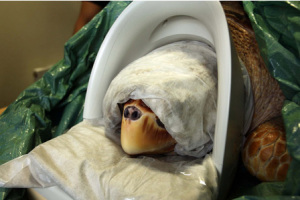by
Brendon Nafziger, DOTmed News Associate Editor | June 29, 2011

Snorkel preparing for the scan.
(Credit: © Neil Hope/www.divingimages.co.uk)
Lightly sedated to calm her nerves, Snorkel underwent her first head MRI scan last week, as doctors feared she might have had a brain tumor. The slides still need to be fully examined, but so far, radiologists say she seems to be cancer-free.
The scans were performed at an imaging center in Cheltenham, England, which says it has one of the country's first open-bore MRIs (Panorama high-field Open MRI, Philips Healthcare). Snorkel actually had to make a nearly 320-mile trek from her home, in Plymouth, because she was too hefty for smaller machines.
Of course, she is an unusual patient for the Cheltenham Imaging Center. She is, after all, a loggerhead turtle from the National Marine Aquarium in England.



Ad Statistics
Times Displayed: 138252
Times Visited: 7982 MIT labs, experts in Multi-Vendor component level repair of: MRI Coils, RF amplifiers, Gradient Amplifiers Contrast Media Injectors. System repairs, sub-assembly repairs, component level repairs, refurbish/calibrate. info@mitlabsusa.com/+1 (305) 470-8013
She's not, perhaps, in great shape. In her mid-twenties, she's blind in one eye, and partly blind in the other. She also has a deformed spine. But veterinarians really began to worry when the turtle, found washed up on a beach in Cornwall in 1990, started to have epileptic fits.
The attacks are now kept partly in check by twice-daily doses of medicine. But after monitoring her for five years and fearing the fits were caused by something more serious, her keepers recently thought it best for her to get a head scan.
The trip took a lot of work: before being sent to the imaging clinic, Snorkel had first to be rubbed down with petroleum jelly to prevent her from drying out.
Although researchers didn't find a tumor, at least not yet, they did find Snorkel was bearing a clutch of (infertile) eggs. Dr. David Gibson, the aquarium's managing director, told BBC News this shows she's in good health.
Loggerhead turtles, listed as threatened or endangered by U.S. officials, can live up to 50 years.
Snorkel is not the first sea turtle to get a head scan. Only two years ago, after suffering head trauma, a Kemp's Ridley turtle named Myrtle underwent an MRI exam at the Medical University of South Carolina’s Center for Advanced Imaging Research (the scanner was a Siemens 3-T Trio).

